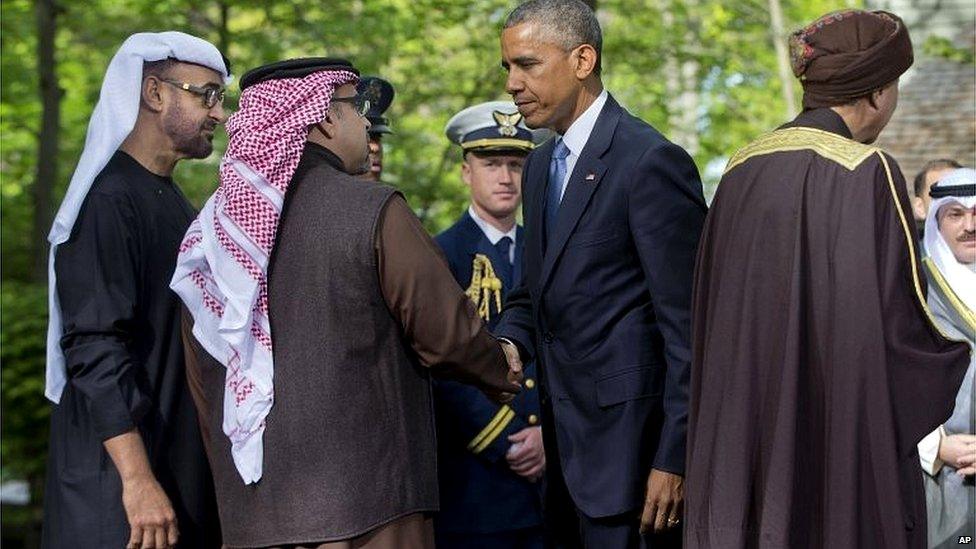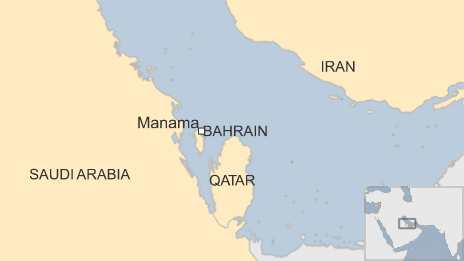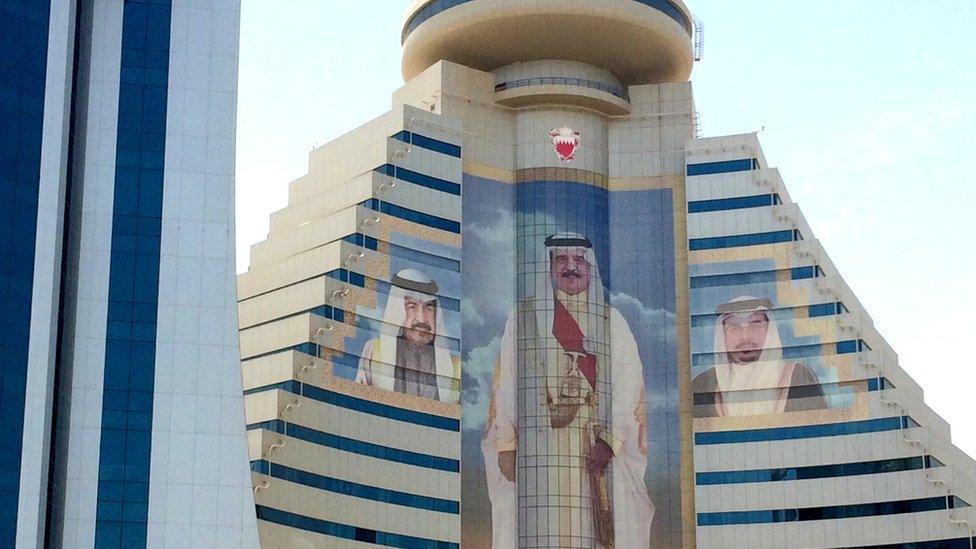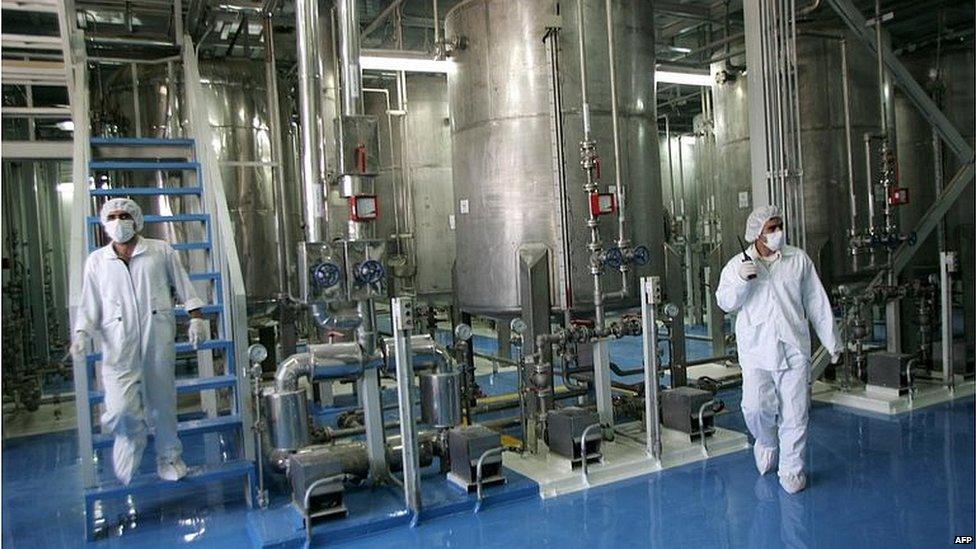Are Iran’s Sunni neighbours about to race for The Bomb?
- Published

Gulf states have been increasingly concerned about US engagement with Iran
The holy month of Ramadan could never be described as a time of feverish activity in the Gulf states that sit between Shia Iran and Sunni Saudi Arabia.
It is brutally hot even after the fasting daylight hours give way to the feasting hours of the humid evening.
The sound of Koran readings in the ancient mosques drifts across the modern skyline - a reminder of the energies devoted to prayerful contemplation.
But this year the atmosphere feels a little different.
In the Gulf there is a keen awareness that the deadline is approaching in the talks between the US-led world powers and the government of Iran over that country's nuclear ambitions.
The Sunni monarchies of the region follow the issue as closely as it is followed in Israel - which of course considers itself the likeliest target for any future Iranian nuclear bomb.
Shia-Sunni divide
The fears in the Gulf are slightly more complex.
Many of the conflicts raging in the Middle East, from Yemen to Iraq to Syria, are defined to some extent by the ancient division between the two main traditions of Islam - Shia and Sunni.

Iran sees itself as a protector of the Shia wherever they may be found and also believes in the right to export its brand of revolution.
Its regional rivals led by Saudi Arabia therefore regard it as a dangerous and destabilising power - ever ready to blow on the flames of political dissent through its proxy armies like Hezbollah in Lebanon.
Major-General Tariq al-Hassan shows Kevin Connolly some of the weapons recovered on anti-terrorist operations
Most of the Gulf states are Sunni with Shia minorities but Bahrain has a Shia majority ruled by a Sunni monarchy.
It is no stranger to political unrest and reports that members of that Shia majority are abused, even tortured, in prison - something the authorities deny.
Add to that the uncomfortable fact that historically Iran once regarded Bahrain as its own territory and that some at least of the Kingdom's Shia population have their roots in Persia and you can see why Bahrain views Iran with particular anxiety.
The Chief of Police in Bahrain, Major-General Tariq al-Hassan, showed me an impressive collection of guns, ammunition and explosives recovered on anti-terrorist operations in recent years.
He says it is clear that Iran is inspiring, inciting and attempting to arm extremist groups in the Kingdom.
"There's no doubt there's overwhelming evidence of Iranian interference, direct and indirect," he told me. "We have evidence the Iranian Revolutionary Guard Corps or elements within it have been involved in training, funding and recruiting terrorists in Bahrain."

Read Kevin Connolly's other reports in this series:

Empowering Iran
The problem for the Gulf states is that it is possible to see a downside to the outcome of the nuclear negotiations with Iran however they end.
Bahrain's Foreign Minister Sheikh Khalid Bin Ahmad al-Khalifa
If there is no deal the Iranians may emerge from the talks as an embittered adversary of the Sunni world, readier than ever to support their powerful proxies around the region - that means not just Lebanese Hezbollah but the heavily-armed and well-trained Shia militias of Iraq too.
If there is a nuclear deal and the global economic sanctions are lifted then the Iranians would have much more money to spend on those paramilitary forces if they chose to do so.
And of course there is the over-arching question of Iran's nuclear ambitions themselves.

With a Shia majority among its population, Bahrain's ruling Sunni family feel the country is especially vulnerable
Tehran adamantly denies that it intends to use its increasing nuclear expertise to build a bomb - to weaponise that knowledge, in the jargon of diplomacy.
Its adversaries are united in scepticism but divided about the best way to react if it becomes clear that Iran is seeking to acquire The Bomb.
Israel has been debating for years the possibility of launching pre-emptive air strikes on Iranian nuclear infrastructure - a repeat on a larger scale of the type of air operations undertaken against nuclear targets in both Iraq and Syria in the past.
That carries with it the risk of triggering retaliation from the Iranians of course (perhaps via Hezbollah) and may only delay the project by three-to-five years, according to some experts.
Israel of course already has nuclear weapons of its own - although its strict policy of not acknowledging that fact in public means they are often not discussed as a factor in this equation.
The Gulf states do not have The Bomb - but when I discussed all of this with the foreign minister of Bahrain, Sheikh Khaled bin Ahmad al-Khalifa, he offered a gloomy warning about the dangers of nuclear proliferation in the Middle East.
He said simply: "A nuclear programme that is unchecked, that would produce a nuclear weapon, would no doubt cause an arms race. It wouldn't only be Saudi Arabia but many other countries in the region would want to hire that capability."
US sell-out?
The prospect of a nuclear arms race in the Middle East is a disturbing one - particularly given the almost limitless financial resources that a country like Saudi Arabia could afford to spend on such a project.
It is fair to say though that not everyone in the Middle East - and indeed not everyone in Bahrain - sees things in quite the same way.
Dr Jasim Husain is a senior figure in the Shia al-Wefaq movement which is Bahrain's largest political movement and which boycotted last year's elections here.
He says it is too easy for non-Shia to demonise Iran and makes the point that there are plenty of other risks and dangers in the Middle East too.

Critics have warned any short of a robust deal with Iran could spur other countries in the region to seek nuclear arms
"I think this is really an unfair characterisation of Iran," he told me, "I think it's way too much to describe one country as being very unbalanced and a danger. I think the real problems are the problems we're having with Isis [Islamic State] - they are the real threats in the region."
The world powers negotiating with Iran clearly accept to some extent at least that the government in Tehran is dangerous - both in its readiness to fund paramilitary forces outside its borders and possibly in its nuclear ambitions.
There seems to be a general sense that some sort of deal is likely in which Iran will agree to limits on its nuclear programme in return for an easing of sanctions.
In the Middle East when people feel free to speak off the record they worry a little that America is too keen to make the deal because the Obama administration is desperate for some kind of diplomatic agreement that will be seen as a historical legacy of his presidency.
Managing a process that sees Iran re-integrated into global politics and trade might fit the bill but there are deep fears in the Middle East about the price that Iran might extract in return.
There is much at stake as these talks climax in the Ramadan of 2015 - it will be interesting to see how stable things look when Ramadan rolls round again next year.